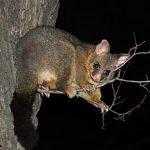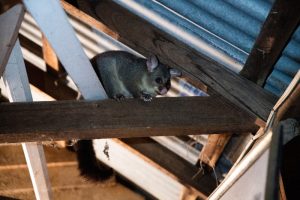
Possums in Melbourne
There are 23 possum species found in Australia. The largest is the ‘cuscus’, while the most common are the ‘Brushtail’ and ‘Ringtail’ possums.
Possums are an Australian native marsupial species which live in urban areas, forests and woodlands and heath. They have adapted well to urban living and often come into contact with people.
The Possum is a social animal and remains in contact with its group through sounds and scents. At times, particularly during the breeding season, it makes piercing screeches in the middle of the night to establish territories and warn of danger. This can be quite frightening if you don’t know what is making noises outside your window.
Possums are a protected species under the Wildlife Act 1975 and must not be harmed in any way. It requires trapped possums to be released the same day on the same property, in their own territory, within 50 metres of the capture site. Hence it is important to block any possible entry points especially into the roof.
Possum species most commonly found in Melbourne by EPC – Enviro Pest Control are:
- Common Brushtail Possum (Trichosurus vulpecula)
- Found throughout Australia and also in New Zealand
- Approx. size; Body 400 mm – 550 mm, Tail 300 mm – 350 mm, weight 1.3 – 4.5 kilos
- Silvery grey in colour with a black band across the snout, with a white to brownish-yellow belly
- In the wild, the Common Brushtail Possum’s diet consists of leaves, blossoms and fruits, but in suburbia it will eat almost anything
- Nocturnal. During the day they retreat to a hollow tree trunk, log, branch or any dark area, even inside house roofs, cavity walls and sheds
- Brushtail Possums use a range of sounds including screams, hissing and growling which are frequent, particularly in mating season
- Common Ringtail Possum (Pseudocheirus peregrinus)
- Approx. size; Body 300 mm – 350 mm, Tail 300 mm – 350 mm, weight 0.7 – 1.1 kilos. They are much smaller than the Brushtail possum
- Variable grey to near-black back, sometimes tinged red-orange, white to red-orange below; red-orange legs with white patches behind the eyes and on the belly
- It has a long prehensile tail with a white tip and is naked underside, furred above. Carried in coil when not used
- Sometimes confused with the Black Rat
- It builds a ‘drey’ or nest in a tree hole, tree fork or dense vegetation
- Prefer to live in large families usually consisting of female possums and their young
Breeding and Life Cycle of Possums
The breeding season for the Common Ringtail Possum is from April to November. The male and the female both build the nest together. The nests are shaped similar to a soccer ball and are built in dense foliage of shrubs or in clumps of mistletoe. Common Ringtail Possums sometimes nest in tree hollows. From 13 months of age the Common Ringtail Possum is sexually active. Gestation is 20-26 days, and one to two (sometimes three) babies are born. The young are born hairless and about the size of a jellybean. They usually have one litter per year in Victoria. After the birth the young will crawl to the pouch of the mother. The young will leave the pouch after 7 weeks, and will instead ride on their mother’s back until they are weaned at about 6 months. Both parents take turns in caring for the young. The father will carry the young on his back while the mother is feeding. The Common Ringtail Possum has large family groups of one male and one or two females from the previous breeding season that will forage and nest together.
Brushtail Females give birth to a single young (mostly March-May), which is carried in the pouch for up to 5 months. When it is too big to fit in the pouch, the young generally rides on its mother’s back. This usually occurs up to the age of about 9 months when it can feed itself. Females usually breed after their first year, and may raise young each year thereafter. Few young die in the pouch, but between 6 and 18 months of age, a considerable number die when they are moving from the area of their birth in an attempt to establish home ranges. Males particularly suffer due to territorial fighting, and as a result make up only one third of the adult population.
Signs of Possum presence
The only solution to possums in your roof is to get them out and stop them getting back in. First check that your roof resident is a possum. Rats make similar noises and often get into roofs. Male possums mark their territory by coating tree branches with a scent released form glands on their chest.
It’s not uncommon for them to nest in roof spaces turning a neat and organized space into a mess of droppings, damaged surrounds and urine stains.
When possums settle in, like most pests, they usually come in waves, inviting all their family and friends to join in on their newly discovered source of food and shelter.
Possums can create urine stains, unpleasant odours and occasional physical damage when living inside buildings. To avoid possums using your roof space for nesting:
- Make sure there are no loose tiles or boards that could be used as entrance points
- Provide an alternative home such as a nesting box. Nesting boxes can be hung in trees or mounted to a timber pole in your garden
- Cut back overhanging branches above your house.
Human feeding of possums can also result in the presence of vermin (rats and mice) at feeding sites
EPC’s Fun facts about Possums
- The Common Ringtail is the only species of possum currently known in which the male helps to care for the young
- The Common Ringtail Possum will eat its own faeces in order to get the maximum amount of nutrients available in eucalyptus leaves
- Female possums are called jills, males jacks, and young are called joeys. A group of possums is known as a passel
Why Hire EPC – Enviro Pest Control To Remove Possums?
At EPC – Enviro Pest Control we have a lot of experience when it comes to possum removals in Melbourne. EPC – Enviro Pest Control will inspect your home or your place of business building and treat the infestation to a control and elimination service. Other reasons to hire us as your Possum treatment service are:
- EPC – Enviro Pest Control staff are Trained Specialists and are experienced at removal of possums
- We arrive on time
- EPC – Enviro Pest Control staff are discreet, friendly and professionally presented
- Fairly priced service with advice to help prevent possums coming back
If you need to speak to a professional about Possum Treatments in Melbourne, call 03 9988 5066 now.
